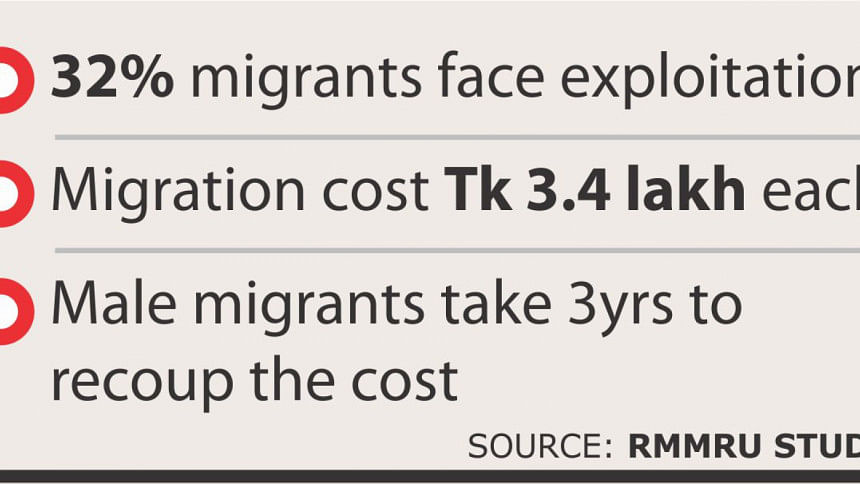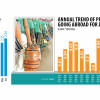Male migrants' remittance drops 11pc

Annual per capita remittance from the male migrants has fallen by 11 percent in 2017 compared to that in 2014, says a new study.
“In terms of taka, remittance from the male migrants has declined by 11 percent. However, if it is adjusted to inflation, the drop would be 26 percent,” says the study “Impact of Migration on Poverty and Growth in Bangladesh” presented at the capital's Brac Centre Inn yesterday.
The annual remittance from male migrants, which was Tk 218,812 each in 2014, came down to Tk 193,885, show data derived from surveys covering 6,143 households in 20 districts in 2014 and in 2017.
However, remittance from the female migrants rose by 1.5 percent from Tk 109,652 each in 2014 to Tk 111,271 last year. But if it is adjusted to inflation, the remittance would fall by 15 percent, the study says.
“This is mostly because of abusive labour practices and economic slowdown in the Middle East and Southeast Asian countries,” said Tasneem Siddiqui, lead researcher for the study and chair of Refugee and Migratory Movements Research Unit (RMMRU) at Dhaka University.
The RMMRU conducted the study with support from Swiss Agency for Development and Cooperation (SDC).
RMMRU researchers Ananta Neelim and C Rashaad Shabab presented the findings, which are significant given that some 10 million Bangladeshis, including five lakh women, work abroad.
The number of Bangladeshi migrants has increased significantly in recent years. In 2014, 4.26 lakh Bangladeshis migrated to different countries. The number was 10.08 lakh last year.
However, remittance from migrants fell to $13.5 billion last year from $14.9 billion in 2014, show Bangladesh Bank data.
Zahid Hussain, lead economist at the World Bank's Dhaka office, termed it a puzzling phenomenon.
Common explanation for the decline was that a large number of migrants send money home via informal channels as the cost of money transfer through formal channels is high. However, the latest findings give a new perspective, he said.
Tasneem said their study found at least 32 percent of the migrants either face joblessness abroad or don't get regular wages. Many of them return home a few months after going abroad.
Often they have to pay high amounts for visa renewal -- a factor that may lead to a decline in per capita remittance, she said.
“It is clear that many of the migrants, who go abroad with hopes of higher incomes, are not achieving their expected goals. Many do risky jobs,” said Tasneem, who teaches political science at Dhaka University.
On the other hand, the average migration cost of Bangladeshis is still very high though it came down to Tk 3.42 lakh each last year from Tk 3.82 lakh in 2014. The recruitment cost remains high mostly because of the presence of several layers of manpower brokers, she added.
For male migrants, it takes about three years to recoup the migration cost, while it is one year for women migrants, said the researcher.
When migrants return from abroad and stay here, their income drops. This means the migrants' remittance has not been invested in a manner that leads to sustainable income of the migrants' households, she pointed out.
“Labour migration was earlier a sort of insurance for the households. However, its effectiveness has declined. Unless the risks are removed, labour migration may not be a vehicle of sustainable income growth,” Tasneem told The Daily Star.
Most of the female migrants come from lower social and economic strata. If they face sexual or physical abuses abroad, female migration would drop significantly, she said.
“The government needs to be strong in terms of governance and protection of the migrants. If bilateral relations with the labour-destination countries don't work, we need to go for multilateralism in migration negotiations,” she said.
Tasneem suggested that the government bring informal manpower brokers under legal framework for holding them accountable.
Dr Khan Ahmed Sayeed Murshid, director general of Bangladesh Institute of Development Studies, said Bangladesh has reduced its dependence on foreign aid largely due to the remittance from migrants.
It is now important to look at social impacts of international migration and take policies accordingly, he said.
SDC Deputy Head of Mission Beate Elsasser suggested that the authorities maintain records of the returnee migrants to assess the socio-economic impacts of migration on them.
“If migration is to be meant for sustainable development, it has to be safe,” she said.

 For all latest news, follow The Daily Star's Google News channel.
For all latest news, follow The Daily Star's Google News channel. 







Comments